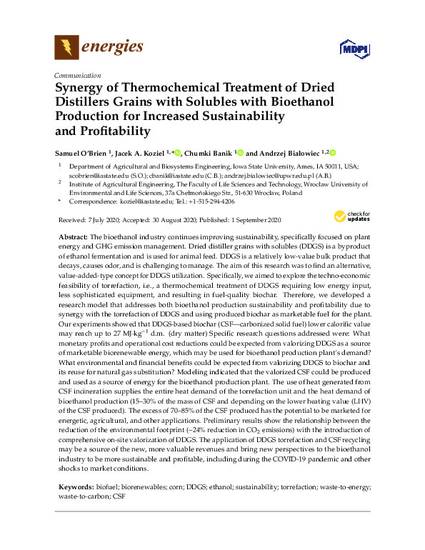
The bioethanol industry continues improving sustainability, specifically focused on plant energy and GHG emission management. Dried distiller grains with solubles (DDGS) is a byproduct of ethanol fermentation and is used for animal feed. DDGS is a relatively low-value bulk product that decays, causes odor, and is challenging to manage. The aim of this research was to find an alternative, value-added-type concept for DDGS utilization. Specifically, we aimed to explore the techno-economic feasibility of torrefaction, i.e., a thermochemical treatment of DDGS requiring low energy input, less sophisticated equipment, and resulting in fuel-quality biochar. Therefore, we developed a research model that addresses both bioethanol production sustainability and profitability due to synergy with the torrefaction of DDGS and using produced biochar as marketable fuel for the plant. Our experiments showed that DDGS-based biochar (CSF—carbonized solid fuel) lower calorific value may reach up to 27 MJ∙kg−1 d.m. (dry matter) Specific research questions addressed were: What monetary profits and operational cost reductions could be expected from valorizing DDGS as a source of marketable biorenewable energy, which may be used for bioethanol production plant’s demand? What environmental and financial benefits could be expected from valorizing DDGS to biochar and its reuse for natural gas substitution? Modeling indicated that the valorized CSF could be produced and used as a source of energy for the bioethanol production plant. The use of heat generated from CSF incineration supplies the entire heat demand of the torrefaction unit and the heat demand of bioethanol production (15–30% of the mass of CSF and depending on the lower heating value (LHV) of the CSF produced). The excess of 70–85% of the CSF produced has the potential to be marketed for energetic, agricultural, and other applications. Preliminary results show the relationship between the reduction of the environmental footprint (~24% reduction in CO2 emissions) with the introduction of comprehensive on-site valorization of DDGS. The application of DDGS torrefaction and CSF recycling may be a source of the new, more valuable revenues and bring new perspectives to the bioethanol industry to be more sustainable and profitable, including during the COVID-19 pandemic and other shocks to market conditions.
Available at: http://works.bepress.com/jacek_koziel/387/

This article is published as O’Brien, S.; Koziel, J.A.; Banik, C.; Białowiec, A. Synergy of Thermochemical Treatment of Dried Distillers Grains with Solubles with Bioethanol Production for Increased Sustainability and Profitability. 13, no 17 Energies (2020): 4528. DOI: 10.3390/en13174528. Posted with permission.